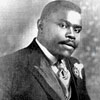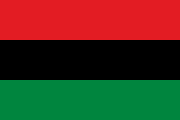Pon Street
Marcus Garvey
 Garvey was a Jamaican-born black nationalist who created a ‘Back to Africa’ movement in the United States. He became an inspirational figure for later civil rights activists.
Garvey was a Jamaican-born black nationalist who created a ‘Back to Africa’ movement in the United States. He became an inspirational figure for later civil rights activists.
 Garvey was a Jamaican-born black nationalist who created a ‘Back to Africa’ movement in the United States. He became an inspirational figure for later civil rights activists.
Garvey was a Jamaican-born black nationalist who created a ‘Back to Africa’ movement in the United States. He became an inspirational figure for later civil rights activists.
Marcus Garvey was born in St Ann’s Bay, Jamaica on 17 August 1887, the youngest of 11 children. He inherited a keen interest in books from his father, a mason and made full use of the extensive family library. At the age of 14 he left school and became a printer’s apprentice where he led a strike for higher wages. From 1910 to 1912, Garvey travelled in South and Central America and also visited London.
During his travels, Garvey became convinced that uniting Blacks was the only way to improve their condition. Towards that end, he departed England on 14 June 1914 aboard the S.S. Trent, reaching Jamaica on 15 July 1914. He founded the Universal Negro Improvement Association (UNIA) in August 1914 as a means of uniting all of Africa and its diaspora (the migrants that had left Africa) into “one grand racial hierarchy.” Amy Ashwood, who would later be Garvey’s first wife, was among the UNIA ounders. As the group’s first President-General, Garvey’s goal was “to unite all people of African ancestry of the world to one great body to establish a country and absolute government of their own.”
In 1916, Garvey moved to Harlem in New York where UNIA thrived. By now a formidable public speaker, Garvey spoke across America. He urged African-Americans to be proud of their race and return to Africa, their ancestral homeland and attracted thousands of supporters.
To facilitate the return to Africa that he advocated, in 1919 Garvey founded the Black Star Line, to provide transportation to Africa, and the Negro Factories Corporation to encourage black economic independence. Garvey also unsuccessfully tried to persuade the government of Liberia in west Africa to grant land on which black people from America could settle.
Garvey next set about the business of developing a program to improve the conditions of those of African ancestry “at home and abroad” under UNIA auspices. On 17 August 1918, publication of the widely distributed Negro World newspaper began. Garvey worked as an editor without pay until November 1920. By June 1919 the membership of the organization had grown to over two million.
By August 1920, the UNIA claimed four million members. That month, the International Convention of the UNIA was held. With delegates from all over the world in attendance, over 25,000 people filled Madison Square Garden on 1 August to hear Garvey speak.
In 1922, Garvey was arrested for mail fraud in connection with the sale of stock in the Black Star Line, which had now failed. Although there were irregularities connected to the business, the prosecution was probably politically motivated, as Garvey’s activities had attracted considerable government attention. Garvey was sent to prison and later deported to Jamaica.
In 1935, he moved permanently to London where he died on 10 June 1940. During these last five years, Garvey remained active and in touch with events in war-torn Ethiopia (then known as
On 10 June 1940, Garvey died after two strokes, putatively after reading a mistaken, and negative, obituary of himself in the Chicago Defender which stated, in part, that Garvey died “broke, alone and unpopular”.[32]Because of travel conditions during World War II, he was interred at Kensal Green Cemetery in London. Rumours claimed that Garvey was in fact poisoned on a boat on which he was travelling and that was where and how he actually died.
In 1964, his remains were exhumed and taken to Jamaica. On 15 November 1964, the government of Jamaica, having proclaimed him Jamaica’s first national hero, re-interred him at a shrine in National Heroes Park.
Garvey’s memory has been kept alive. Schools, colleges, highways, and buildings in Africa, Europe, the Caribbean, and the United States have been named in his honor. The UNIA

Malcolm X’s parents, Earl and Louise Little, met at a UNIA convention in Montreal. Earl was the president of the UNIA division in
Kwame Nkrumah named the national shipping line of Ghana the Black Star Line in honor of Garvey and the UNIA. Nkrumah also named the national
During a trip to Jamaica,
King was also the posthumous recipient of the first Marcus Garvey Prize for Human Rights on 10 December 1968 issued by the Jamaican Government and presented to King’s widow.
For further information on Marcus Garvey see the website http://www.marcusgarvey.com/

